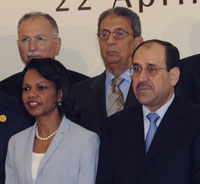
SOURCE: AP/Gustavo Ferrari
Representatives of the United States, Iraq, the United Nations, and the Arab League at The Third Ministerial Conference of the Neighboring Countries of Iraq in Kuwait, Tuesday, April 22, 2008.
Last week the world witnessed the potential that Arab unity could have. Egypt, Saudi Arabia, Jordan, Kuwait, Qatar, the United Arab Emirates, and the Arab League joined the United States, the United Nations, Britain, France, Italy, Germany, and Russia at The Third Ministerial Conference of the Neighboring Countries of Iraq to hear how they can support Iraq both economically and politically. In addition to the Iraq conference, Arab foreign ministers and Western officials gathered as “Friends of Lebanon,” in which they met in a united effort to discuss ways to resolve the political deadlock in Lebanon. These types of group efforts by Arab leaders must be praised, supported, and repeated in order to reward those who take the difficult steps toward accountability and responsibility for their own people and interests.
After seven years of relative inaction on peace in the Middle East, last November’s Annapolis peace conference initiated by President Bush and Secretary Rice broke ground by providing a forum for Arab states to gather and work collectively toward Arab-Israeli peace. The meeting was particularly noteworthy because it corrected old mistakes that stymied earlier peace efforts.
The Camp David summit in 2000 was criticized and undermined because it only included the United States, Israel, and the Palestinians in the process. The Bush administration took a different approach for the Annapolis meeting. It recognized the need to include the wider international community and invited representatives of nearly 50 countries and institutions to participate, including Syria, which has usually been isolated by the Bush administration.
The Annapolis meeting did offer a lot of promise, but as the days and months have passed, Arab states have again become fractured. Saudi Arabia and Egypt are in a public dispute with Syria over its relationship with Iran and Hezbollah and its influence in Lebanese politics. As the region’s two traditional big Arab players, this dispute with Syria has prompted a wave of discord throughout the Arab world.
The United States must continue the leadership it displayed in Annapolis. If the United States sponsors follow up opportunities for Arab leaders to cooperate, it is likely—as we saw at Annapolis—that Arab leaders will gather in a united front to work toward progress on the key issues affecting their region.
One of the biggest problems affecting the Middle East right now is an imbalance of power and the dominance of a few states. Israel, Turkey, Saudi Arabia, Egypt, and Iran remain dominant largely because of their military, economic, and political strength. Consequently, the region and its citizens have fallen victim to the national interests of a few. In order to counter these pockets of concentrated power, the Arab world should promote joint efforts to achieve progress on multiple fronts in the Middle East.
Critics may say that it is naïve to suggest that these powerful countries would willingly yield power, but this is why an active U.S. role is required. The United States must make the case to the Arab powers that the status quo of divided interests is harming the security of all states in the region and thus cannot continue. Terrorism, nuclear proliferation, crumbling political systems, and the creation of a unified Palestinian state are major undertakings that require all inclusive approaches. Failure to address these problems appropriately will have negative repercussions for all states in the region.
In order to stabilize Iraq and indeed the region, there must also be a unified effort led by the United Stated and implemented by Arab states to get beyond national interests and work to contain the problems in Iraq.
U.S. troops are undergoing a huge undertaking to protect Iraqis and stabilize Iraq, and the efforts of these service men and women have improved the situation to some degree. Yet sectarian fighting and a lack of political progress in Baghdad continue to undermine recent gains in security. The divisions within Iraq are deep and enduring and cannot be overcome without the assistance of outsiders to mediate the various disputes. Thus, although the war in Iraq was a U.S.-led initiative, the problems that have surfaced as a consequence of the war are beyond the capacity of the United States and Baghdad to resolve on their own. Arab leaders must accept this as a fact, regardless of their views about the legitimacy or justness of the war.
Fostering Arab unity will be no easy task; in fact, it completely diverges from current U.S. policy, which currently only grants legitimacy to some Arab states and isolates others such as Syria. Yet with burgeoning areas of instability throughout the Middle East and the upcoming end of the Bush administration, now is the time to rethink old policies and to try new tactics.
One way the United States can foster Arab unity is to accept its shortcomings. Gone are the days when the United States can simply try to achieve progress unilaterally—this is one of the costly lessons of Iraq. The United States must accept its place in a pluralistic world and must pursue policies that are multilateral in nature. If the United States is candid about its limitations and reveals that it needs help out of Iraq, this will invite Arab leaders to come to the political roundtable as equals and most importantly as Arab partners for peace and stability in the Middle East.